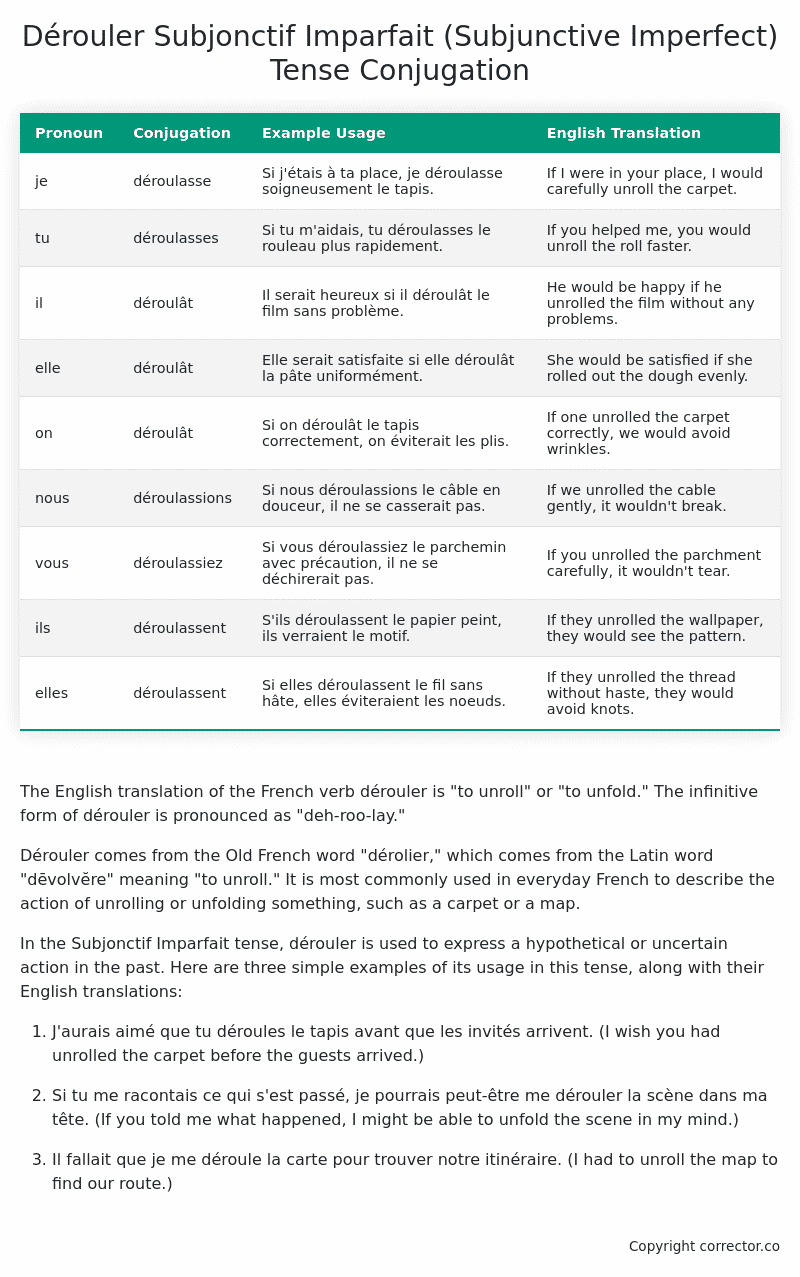Subjonctif Imparfait (Subjunctive Imperfect) Tense Conjugation of the French Verb dérouler
Introduction to the verb dérouler
The English translation of the French verb dérouler is “to unroll” or “to unfold.” The infinitive form of dérouler is pronounced as “deh-roo-lay.”
Dérouler comes from the Old French word “dérolier,” which comes from the Latin word “dēvolvĕre” meaning “to unroll.” It is most commonly used in everyday French to describe the action of unrolling or unfolding something, such as a carpet or a map.
In the Subjonctif Imparfait tense, dérouler is used to express a hypothetical or uncertain action in the past. Here are three simple examples of its usage in this tense, along with their English translations:
-
J’aurais aimé que tu déroules le tapis avant que les invités arrivent. (I wish you had unrolled the carpet before the guests arrived.)
-
Si tu me racontais ce qui s’est passé, je pourrais peut-être me dérouler la scène dans ma tête. (If you told me what happened, I might be able to unfold the scene in my mind.)
-
Il fallait que je me déroule la carte pour trouver notre itinéraire. (I had to unroll the map to find our route.)
Table of the Subjonctif Imparfait (Subjunctive Imperfect) Tense Conjugation of dérouler
| Pronoun | Conjugation | Example Usage | English Translation |
|---|---|---|---|
| je | déroulasse | Si j’étais à ta place, je déroulasse soigneusement le tapis. | If I were in your place, I would carefully unroll the carpet. |
| tu | déroulasses | Si tu m’aidais, tu déroulasses le rouleau plus rapidement. | If you helped me, you would unroll the roll faster. |
| il | déroulât | Il serait heureux si il déroulât le film sans problème. | He would be happy if he unrolled the film without any problems. |
| elle | déroulât | Elle serait satisfaite si elle déroulât la pâte uniformément. | She would be satisfied if she rolled out the dough evenly. |
| on | déroulât | Si on déroulât le tapis correctement, on éviterait les plis. | If one unrolled the carpet correctly, we would avoid wrinkles. |
| nous | déroulassions | Si nous déroulassions le câble en douceur, il ne se casserait pas. | If we unrolled the cable gently, it wouldn’t break. |
| vous | déroulassiez | Si vous déroulassiez le parchemin avec précaution, il ne se déchirerait pas. | If you unrolled the parchment carefully, it wouldn’t tear. |
| ils | déroulassent | S’ils déroulassent le papier peint, ils verraient le motif. | If they unrolled the wallpaper, they would see the pattern. |
| elles | déroulassent | Si elles déroulassent le fil sans hâte, elles éviteraient les noeuds. | If they unrolled the thread without haste, they would avoid knots. |
Other Conjugations for Dérouler.
Le Present (Present Tense) Conjugation of the French Verb dérouler
Imparfait (Imperfect) Tense Conjugation of the French Verb dérouler
Passé Simple (Simple Past) Tense Conjugation of the French Verb dérouler
Passé Composé (Present Perfect) Tense Conjugation of the French Verb dérouler
Futur Simple (Simple Future) Tense Conjugation of the French Verb dérouler
Futur Proche (Near Future) Tense Conjugation of the French Verb dérouler
Plus-que-parfait (Pluperfect) Tense Conjugation of the French Verb dérouler
Passé Antérieur (Past Anterior) Tense Conjugation of the French Verb dérouler
Futur Antérieur (Future Anterior) Tense Conjugation of the French Verb dérouler
Subjonctif Présent (Subjunctive Present) Tense Conjugation of the French Verb dérouler
Subjonctif Passé (Subjunctive Past) Tense Conjugation of the French Verb dérouler
Subjonctif Imparfait (Subjunctive Imperfect) Tense Conjugation of the French Verb dérouler (this article)
Subjonctif Plus-que-parfait (Subjunctive Pluperfect) Tense Conjugation of the French Verb dérouler
Conditionnel Présent (Conditional Present) Tense Conjugation of the French Verb dérouler
Conditionnel Passé (Conditional Past) Tense Conjugation of the French Verb dérouler
L’impératif Présent (Imperative Present) Tense Conjugation of the French Verb dérouler
L’infinitif Présent (Infinitive Present) Tense Conjugation of the French Verb dérouler
Struggling with French verbs or the language in general? Why not use our free French Grammar Checker – no registration required!
Get a FREE Download Study Sheet of this Conjugation 🔥
Simply right click the image below, click “save image” and get your free reference for the dérouler Subjonctif Imparfait tense conjugation!

Dérouler – About the French Subjonctif Imparfait (Subjunctive Imperfect) Tense
Formation
Common Everyday Usage Patterns
Interactions with Other Tenses
Subjonctif Présent
Indicatif Passé Composé
Conditional
Conditional Perfect
Summary
I hope you enjoyed this article on the verb dérouler. Still in a learning mood? Check out another TOTALLY random French verb conjugation!


